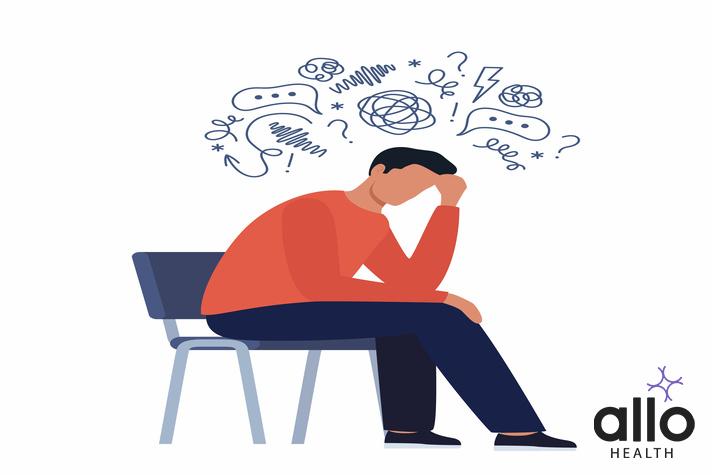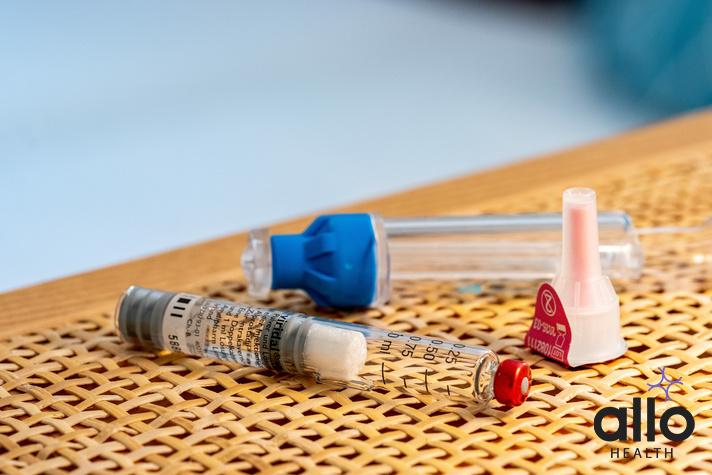Urologists On Erectile Dysfunction

Allo Health is dedicated to personalized well-being, offering support and trusted information tailored to individual health goals. The platform emphasizes human-generated content, led by a distinguished medical team of experts, including physicians and sexual health specialists. Their commitment to credibility involves rigorous fact-checking, authoritative research, and continuous updates to ensure accurate, up-to-date information. Allo Health's unique approach goes beyond conventional platforms, providing expert-led insights and a continuous commitment to excellence, with user feedback playing a crucial role in shaping the platform's authoritative voice.

Dr Sanina Mansoor holds MBBS degree from Yenepoya university,Mangalore.She has 8 years of experience working as a medical officer at various health centres and medical colleges.
Why This Was Upated?
Our experts continually monitor the health and wellness space, and we update our articles when new information became available.
Updated on 10 June, 2024
- Article was updated as part of our commitment to diversity, equity, and inclusion.

"The following blog article may discuss medical treatments and interventions. However, it is important to note that the information provided is for general educational purposes only and should not be considered as a substitute for professional medical advice, diagnosis, or treatment. Always seek the guidance of a qualified healthcare professional for personalized medical advice.
Book consultation
Medical treatments are complex and should be tailored to individual circumstances. The information presented in this blog may not be applicable to everyone, as each person's medical condition, history, and needs are unique. Only a qualified healthcare professional can evaluate your specific medical situation, consider relevant factors, and provide appropriate recommendations for diagnosis, treatment options, and monitoring.
It is crucial to note that self-diagnosis, self-medication, or relying solely on the information provided in this blog for treatment decisions can have serious health consequences. "
(ED) is a common condition that affects a huge number of men across the world. ED can be caused by a wide range of factors, including physical and psychological issues. When left untreated, ED can have a significant impact on a man’s quality of life, causing stress, anxiety, and relationship issues.
What is Erectile Dysfunction?
Erectile dysfunction, also known as impotence, is the inability to achieve or maintain an erection firm enough for sexual intercourse. This condition can occur at any age, but it’s more common in tricenarian men (aged between 30- 40).
- There are physical health conditions that cause erectile dysfunction include high blood sugar levels, vascular disease, high blood pressure, heart disease, obesity, and smoking.
- Psychological factors can also play a role. Mental health conditions, stress, anxiety, depression, and relationship issues can be the underlying conditions to contribute to difficulties with achieving or maintaining an erection.
Treatment options for erectile dysfunction vary depending on the underlying cause. Lifestyle changes such as quitting smoking, losing weight, and exercising regularly can help improve symptoms. Medications such as Viagra, Cialis, and Levitra are also commonly prescribed to help with erectile dysfunction. In some cases, surgery may be necessary.
Common Causes of Erectile Dysfunction
Many different factors can contribute to the development of erectile dysfunction. Some of the most common causes include physical issues such as obesity, high blood pressure, heart disease, and diabetes.
Psychological causes such as anxiety, depression, and stress can also cause erectile dysfunction and can be threats to reproductive organs. Other factors that can increase the risk of developing ED include smoking, alcohol use, and certain medications.

Another common cause of erectile dysfunction is hormonal imbalances. Low levels of testosterone can lead to a decreased sex drive and difficulty achieving or maintaining an erection. Additionally, certain medical conditions such as thyroid concerns or pituitary gland disorders can also affect hormone levels and contribute to ED.
In some cases, erectile dysfunction may be a symptom of an underlying health condition. For example, ED can be a sign of cardiovascular disease, as the same factors that contribute to heart disease can also affect blood flow to the penis. It is important to speak with a healthcare provider if you are experiencing erectile dysfunction, as they can help determine the underlying cause and recommend appropriate treatment options.
How Can a Urologist Help with Erectile Dysfunction?
A urologist is a medical professional specializing in diagnosing and treating conditions affecting the urinary tract and male reproductive system. When it comes to erectile dysfunction, a urologist can help by performing a thorough physical examination, taking a patient’s medical history, knowing about sexual history and psychological issues as well, and ordering any necessary diagnostic tests. Based on the results, the urologist can develop a personalized treatment plan tailored to each individual’s needs.
In addition to medical treatment, a urologist can also provide counseling and education to patients and their partners about the causes and management of erectile dysfunction. They can also offer advice on lifestyle changes, such as exercise and diet, that can improve overall health and potentially alleviate symptoms of erectile dysfunction. It is important for individuals experiencing erectile dysfunction to seek the help of a urologist, as this condition can be a sign of underlying health issues that require medical attention. Thorough blood tests should be done to consider all possibilities of health and disease.
Importance of Early Diagnosis and Treatment
If left untreated, erectile dysfunction can have a significant impact on a man’s quality of life. It can lead to stress, anxiety, and relationship issues. In addition, untreated ED can also increase the risk of other health complications such as cardiovascular disease. That’s why it’s important to seek treatment as soon as possible after experiencing symptoms of erectile dysfunction.
Early diagnosis and treatment of erectile dysfunction can also improve overall sexual satisfaction and may increase sexual desire and confidence. Men who seek different types of treatment for ED often report improved self-esteem and a better sense of well-being. Additionally, early treatment can prevent the progression of the condition, which may require more invasive treatments in the future.
There are several treatment options available for erectile dysfunction, including medication, therapy, and lifestyle changes. However, the most effective treatment will depend on the underlying cause of the condition. That’s why it’s important to consult with a healthcare provider who can help determine the best course of action for each individual.
Understanding the Different Treatment Options Available

There are many different treatment options available for erectile dysfunction. Some of the most common treatments include oral medications such as sildenafil (Viagra), tadalafil (Cialis), and vardenafil (Levitra). Other treatment options include penile injections, vacuum devices, injection therapy, and penile implants. Psychological counseling and lifestyle changes such as diet and exercise can also help improve erectile dysfunction.
Medications for Erectile Dysfunction: Pros and Cons
Oral medications are one of the most common treatments prescribed for erectile dysfunction. While they can be effective, they also come with some risks and side effects. Some of the most common side effects of these medications include headache, flushing, and gastrointestinal issues. It’s important to discuss the pros and cons of medication with a urologist before starting treatment.
Aside from oral medications, there are other treatment options available for erectile dysfunction. These include penile injections, vacuum devices, and penile implants. Each of these options has its own set of pros and cons, and it’s important to discuss them with a healthcare provider to determine which option is best for you.
However, all medications for ED have the potential to interact with other medications, including several medications for hypertension (high blood pressure) and heart disease.
If you’re considering using any type of ED medication, you’ll need to be aware of the following potential drug interactions:
- Nitrates. When used with nitrates, ED medications can cause a sudden drop in blood pressure that may be life-threatening. Nitrates include nitroglycerin and poppers used for recreational purposes.
- Antihypertensives. Certain other medications used to treat high blood pressure, such as alpha-blockers, may interact with ED medications.
- CYP3A4 inhibitors. Medications that inhibit the enzyme CYP3A4, such as some protease inhibitors, antifungals, and antibiotics, may cause interactions when used with ED pills.
Although very uncommon, ED medications have risk factors that may also cause priapism — prolonged, painful erections that can damage the tissue of your penis. It’s important to seek medical help as soon as you can if you develop a persistent and/or painful erection.
Lifestyle Changes That Can Help Improve Erectile Dysfunction
- In some cases, making simple lifestyle changes can help improve erectile dysfunction. For example, losing weight, quitting smoking, and reducing alcohol consumption can all have a positive impact on erectile function. Increasing exercise and eating a healthy diet can also help improve overall health and reduce the risk of developing cardiovascular disease.
- Another lifestyle change that can help improve erectile dysfunction is reducing stress. Stress can hurt sexual function, so finding ways to manage stress, such as through meditation or exercise, can be beneficial.
- In addition, getting enough sleep is important for overall health and can also improve erectile function. Lack of sleep can lead to fatigue and decreased libido, which can contribute to erectile dysfunction. Making sure to get enough restful sleep each night can help improve sexual function.
Psychological Factors That Affect Erectile Functioning
Psychological factors such as anxiety, stress, and depression can all contribute to the development of erectile dysfunction. In some cases, psychological counseling may be recommended as part of the treatment plan. Working with a therapist or counselor can help identify underlying issues and explore new coping strategies.
Another psychological factor that can affect erectile functioning is performance anxiety. Men who are worried about their sexual performance or have had negative experiences in the past may experience difficulty achieving or maintaining an erection. This can create a cycle of anxiety and further exacerbate the concern. In these cases, therapy or counseling can help address the underlying anxiety and provide tools for managing it.
Several oral drugs like anti-depressants, and recreational drugs may also cause adverse effects.
In addition to counseling, lifestyle changes can also have a positive impact on erectile functioning. Regular exercise, a healthy diet, and stress-reducing activities such as meditation or yoga can all help improve overall physical and mental health, which can in turn improve sexual function. It’s important to address both the physical and psychological factors that contribute to erectile dysfunction to achieve the best possible outcome.
The Role of Hormones in Erectile Functioning
- Hormones play a crucial role in erectile functioning. In some cases, low levels of testosterone can contribute to the development of erectile dysfunction.
- Hormone replacement therapy may be recommended in these cases to help boost testosterone levels and improve erectile function.
- It’s important to work closely with a urologist to ensure that hormone therapy is safe and effective.
- However, it’s important to note that hormones are not the only factor that affects erectile functioning.
- Other factors such as psychological issues, lifestyle habits, and underlying medical conditions can also contribute to erectile dysfunction.
Therefore, a comprehensive approach that addresses all potential causes may be necessary for effective treatment.
Surgical Options for Erectile Dysfunction: What You Need to Know
Surgery is typically only recommended for erectile dysfunction when all other treatment options have failed. Some of the surgical options that may be considered include penile prostheses and vascular surgery. It’s important to discuss the potential risks and benefits of these procedures with a urologist before making a decision.
Penile prostheses are devices that are surgically implanted into the penis to allow for an erection. There are two main types of penile prostheses: inflatable and non-inflatable.
- Inflatable prostheses consist of two cylinders that are implanted into the penis, a pump that is implanted into the scrotum, and a reservoir that is implanted into the abdomen.
- Non-inflatable prostheses consist of a set of rods that are implanted into the penis. Both types of prostheses can be effective in treating erectile dysfunction, but they do carry some risks, such as infection and mechanical failure.
- Vascular surgery is another surgical option for erectile dysfunction. This type of surgery involves repairing or replacing the blood vessels that supply blood to the penis.
- This can be done through a variety of techniques, such as bypass grafting or arterial ligation. Vascular surgery can be effective in treating erectile dysfunction caused by vascular concerns, but it also carries risks, such as bleeding and infection.
Benefits and Risks of Penile Implants for Erectile Dysfunction
- Penile implants are a type of surgical procedure that involves placing a device in the penis. While these implants are effective at improving erectile function, they do come with some risks and potential complications. It’s important to discuss all of the potential risks and benefits of a penile implant with a urologist before undergoing the procedure.
- One of the benefits of penile implants is that they can provide a long-term solution for erectile dysfunction. Unlike medications or other treatments that may only provide temporary relief, a penile implant can last for years and allow for spontaneous sexual activity. Additionally, penile implants can improve the quality of erections and increase sexual satisfaction for both the patient and their partner.
- However, it’s important to note that there are also potential risks associated with penile implants, such as infection, mechanical failure, and erosion of the implant. It’s crucial to carefully weigh the potential benefits and risks with a urologist before deciding if a penile implant is the right treatment option for you.
Alternative Therapies for Erectile Dysfunction: Are They Effective?
There are many alternative therapies available for the treatment of erectile dysfunction. Some of these therapies include herbal supplements, acupuncture, and massage. While some studies have suggested that these therapies may be effective, more research is needed to fully understand their potential benefits and risks.
Herbal supplements are one of the most popular alternative therapies for erectile dysfunction. Some of the commonly used herbs include ginseng, horny goat weed, and Yohimbe. While these herbs have been used for centuries to treat sexual dysfunction, their effectiveness and safety are still being studied.
Acupuncture and massage are also alternative therapies that have been used to treat erectile dysfunction. Acupuncture involves the insertion of thin needles into specific points on the body to stimulate blood flow and promote healing. Massage, on the other hand, involves the manipulation of soft tissues to improve circulation and reduce stress. While these therapies may provide some relief for erectile dysfunction, more research is needed to determine their effectiveness.
Don’t Suffer in Silence
Erectile dysfunction is a common condition that affects millions of men around the world. If you’re experiencing symptoms of erectile dysfunction, don’t suffer in silence. Seeking the help of a urologist can help you identify the underlying causes of your condition and develop a personalized treatment plan that can help improve your quality of life. From medication to surgery, there are many different treatment options available. By working closely with a urologist, you can find the right solution for you and get back to enjoying life to the fullest.
It’s important to remember that erectile dysfunction can also have psychological causes, such as anxiety or depression. In these cases, seeking the help of a mental health professional can be just as important as seeing a urologist. Therapy and counseling can help you address any underlying emotional issues that may be contributing to your condition.
Additionally, making lifestyle changes such as quitting smoking, reducing alcohol consumption, and exercising regularly can also help improve erectile dysfunction. By taking a holistic approach to your health and seeking the appropriate medical and psychological care, you can overcome erectile dysfunction and improve your overall well-being.
Most Asked Questions
-
What Initial Assessments and Tests Can I Expect from a Urologist for Erectile Dysfunction?
A urologist may conduct a thorough evaluation, which may include a detailed medical history, physical examination, and specific tests. Blood tests to check hormone levels, cholesterol, and diabetes, as well as imaging studies to assess blood flow to the penis, may be recommended. These assessments help identify underlying factors contributing to erectile dysfunction and guide appropriate treatment.
-
What Lifestyle Changes Might a Urologist Suggest for Managing Erectile Dysfunction?
Experienced Urologists often emphasize lifestyle modifications to manage erectile dysfunction effectively. Recommendations may include adopting a heart-healthy diet, engaging in regular physical activity, maintaining a healthy weight, and avoiding smoking and excessive alcohol consumption. These lifestyle changes contribute to overall cardiovascular health, a key factor in erectile function.
-
What Medications or Treatments Might a Urologist Prescribe for Erectile Dysfunction?
Urologists may prescribe medications to address erectile dysfunction, such as phosphodiesterase type 5 (PDE5) inhibitors like Viagra, Cialis, or Levitra. These medications enhance blood flow to the penis. In some cases, other treatment options may be considered, including hormone replacement therapy, alprostadil injections or suppositories, vacuum erection devices, or penile implants. The choice of treatment depends on the underlying cause and individual circumstances.
-
Can Psychological Factors Contribute to Erectile Dysfunction, and How Might a Urologist Address Them?
Psychological factors can contribute to erectile dysfunction, and a urologist may address this aspect by recommending psychological or sex therapy. These therapies help individuals and couples address emotional and relationship issues that may be impacting sexual function. Urologists work in collaboration with mental health professionals to provide a comprehensive approach to treatment.
-
How Often Should I Follow Up with a Urologist After Starting Treatment for Erectile Dysfunction?
The frequency of follow-up appointments with a urologist depends on the individual's response to treatment and the chosen intervention. Initially, follow-up visits may be scheduled to assess the effectiveness of medications or other treatments. Adjustments to the treatment plan may be made based on the individual's progress. Once a stable and effective treatment plan is established, periodic follow-ups may be recommended to monitor long-term success and address any emerging concerns.






































